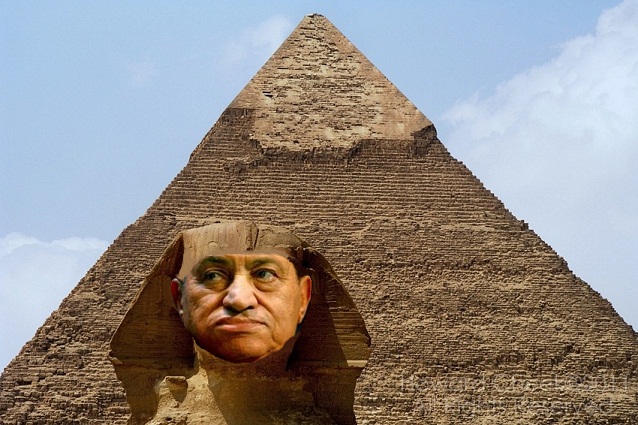Miss me yet?
A must read!
After centuries of brainwashing, Islam is in the Egyptian DNA, and no matter how many governments come an go, the Islamic society will reject the civil society and any government that tries to (in vain) institute it, it has to come from within, therein lies the dilemma.
Deposing Morsi Won’t End the Chronic Rejection of Secularism in Egypt
What the late P.J. Vatikiotis left for Egypt delusionists of all ilks, past and present, to learn:
The [1923] constitution itself proclaimed Islam as the official religion of the state, inevitably undermining its other provisions relating to the rights of citizens such as freedom of worship or belief, speech, and so forth…Until a secular formula of identity and social cohesiveness is found that is acceptable, the religious or traditional one will dominate the social order. And to this extent the question of religion and state will remain unresolved. But that will require a commitment on the part of the leadership to remove religion from the public realm altogether and relegate it to the realm of private belief. However, as long as it insists on identifying itself with the theoretical unity of the umma, the Islamic community, it will always suffer the consequences of the fusion, real or assumed, between sanctity and power
The late, brilliant political scientist, P.J. Vatikiotis (d. 1997), educated at the American University in Cairo, Egypt, and author of many important analyses of Egyptian socio-political history, opened his seminal 1981 study, “Religion and State,” with these words:
“Religion and State” is not a new preoccupation in the study of Egyptian or any other society where the faith of Islam predominates.
Vatikiotis adds that this “difficult and largely unresolved problem”—present since the 7th century advent of Islam—derived from, and continued to manifest, in Egypt, the
…curious “marriage” between a universal religious truth or message and an otherwise very parochial community that held it and fought for it or in its name
Three decades later, despite widespread euphoria regarding the mass movementwhich prompted a military coup deposing Egypt’s first popularly-elected President, Muhammad Morsi, and his coterie of Muslim Brotherhood ideologues, the ancient-cum-modern conundrum elucidated by Vatikiotis, remains tragically unresolved within this Muslim-dominant society. Vatikiotis’ sobering and remarkably compendious 1981 analysis also explodes the instantlymanufactured (and popularized) canard that Morsi’s ouster somehow “discredited and marginalized Islamism”—a chimerical Western constructinvented to avoid dealing forthrightly with mainstream, traditionalist Islam, and its votaries in Egypt, and beyond.
Moreover, across the political, ideological, and cultural spectrum a broad consensus has emerged that Egypt’s dire economic status—exacerbated demonstrably under Morsi’s brief, inept stewardship—was the overriding motivation for the removal of Egypt’s Muslim Brotherhood President, and his administration. Millers and bakers in Egypt, the world’s largest wheat-importing nation, recently warned imported international wheat stocks had “sunk to levels that could reduce the availability of the flour they need to produce bread of an acceptable quality.” One-quarter of Egyptians live below the poverty limit of $1.65 a day, with millions dependent on bread loaves that sell for a state-regulated price of less than 1 U.S. cent per loaf—held constant since 1989, and one-seventh of actual present costs. Egypt’s currency crisis has hindered the Supply Ministry’s ability to make timely payments to the millers, and in April, Morsi failed to secure grain, and a loan from Russia (one of Egypt’s main suppliers of grain) worsening the already dire economic crisis. Egypt’s persistent economic woes have resulted in widespread malnutrition, stunting the growth of 40% of its population, and afflicting the impoverished nation with added healthcare and educational costs, as well as decreased human productivity.
Friday, 7/5/13, alone, in the aftermath of the coup which toppled Morsi, internecine clashes between pro-Morsi and anti-Morsi Egyptian Muslim groups (along with predatory Muslim violence targeting Coptic Christians), killed 46 people, and wounded 1404, according to a local (Al-Hayat) television report. Understandably, such chaotic violence has inspired prevalent sentiments akin to those expressed by Cairene Headwaiter Attef Abdelghalil. Interviewed by Der Spiegel following the coup, Abdelghalil acknowledged that he and most of the staff at perhaps Cairo’s best known teahouse, Café el-Fishawy, had voted for the Muslim Brotherhood due to their perceived honesty and reliability, after 30-years of kleptocratic rule under Mubarak. Now, in the wake of the economic failure wrought by Muslim Brotherhood governance under Morsi, Abdelghalil has no confidence in the “anti-Morsi opposition,” either—or “democracy” itself.
The army should not be in a rush to give up power. Democracy isn’t important at the moment. Only the economy matters. Currently, all we have is chaos. It has to end.


